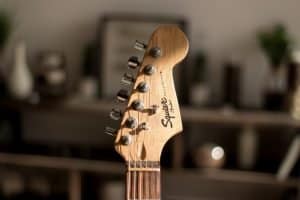Electric guitars have a more diverse sound, and they can be plugged into amplifiers for louder playing. Acoustic guitars don’t need to be plugged in because the guitar’s body acts as the amplifier; thus, making them quieter than an electric guitar. On the other hand, it’s also harder to produce different sounds with an acoustic guitar because you normally don’t use pickups with it.
From here, it’s clear that both electric and acoustic guitars are beautiful musical instruments, but this article is about which is easier to play.
We’ll answer that question plus give some tips as well!
Why Are Acoustic Guitars Harder to Play?
Acoustic is a type of guitar that’s harder to play because of a simple reason:
For a beginner guitarist, s/he will feel soreness his/her fingertips after a day’s worth of playing when learning guitar from a steel-string acoustic guitar. This is because acoustics have a higher string action, which refers to the distance between the strings and the fretboard, compared to electric guitars.
Therefore, acoustic guitar players are required to apply greater pressure from their fingers to the strings on the fret to make it sound good.
You can make playing on an acoustic guitar much more manageable by using classical guitars instead. Instead of being a steel-string guitar, these guitars use nylon strings, requiring less force from your fingers. Therefore, you can still make the classical guitar sound good despite having a lighter touch.
Another solution to making playing on an acoustic instrument relatively easier is using lighter string gauges instead of the thicker strings available in most shops.
Another possible reason (but not really a deal-breaker) is acoustic guitars don’t have pickups that allow users to modify the guitar sound. This is important, especially if you’re into rock music which requires different pedals to achieve the desired sound for your music.
While you can install a pickup on your acoustic guitar so you can plug it through a guitar pedal into a guitar amplifier, it still won’t produce the same range of tone that an electric guitar would.
Is It Easier For Kids to Start With Acoustic or Electric Guitar?
It shouldn’t surprise why many kids first choose electric over acoustic guitars for the reasons above!
They’ll find it easier to use the lighter gauge strings closer to the neck. But, of course, it also doesn’t hurt that electric guitars have much thinner necks than acoustic.
Kids can use the volume knob to control the sound while playing through an electric guitar amp. They can even use headphones to listen to the type of music they’re playing without disturbing people in the house or their neighbors.
On the other hand, starting with an acoustic guitar has its positives. Granted, it’s not easier than the electric, but they’ll be able to develop their finger pressure and strength faster and better.

Because the acoustic guitarist will get used to applying more pressure on the acoustic strings, the learning process from acoustic to electric guitar will be much easier.
They’ll still have to learn the nuances of an electric guitar, i.e., playing notes and chords at different positions in the fret board. However, they will have the foundational skills of playing chords in an acoustic guitar to an electric guitar, which is much easier given its low guitar action.
Should I Learn Acoustic Guitar or Electric Guitar First?
The same concept in the previous section applies here: acoustic guitar allows you to build finger muscles while electric allows you to play rock-oriented songs from the get-go.
So when deciding which instrument to start on, you should ask yourself a few questions. First, what kind of music do you like? If it’s rock and roll or indie pop, then guitars with pickups are the way to go. On the other hand, if you prefer pop, country, jazz music, or acoustic music, then an acoustic guitar is the way.
The second thing to think about is how much time you are willing to spend practicing.
Putting in the work learning through beginner guitar lessons or from a guitar teacher will be vital to your growth as an electric guitarist. However, if you want to learn guitar only as a hobby, you must reconsider which of the two you plan on using.
Tied to the second point is the third: price range.
If aspiring electric guitar players are really into music but not enough to practice for hours every day, buying an expensive electric guitar with all of its attachments can end up being just another toy gathering dust in the corner of his bedroom.
Conversely, an acoustic starter guitar requires fewer accessories and comes in much cheaper than a starter electric guitar. Maintaining an acoustic guitar is also much easier because it has fewer parts for you to worry about.
An example of a starter acoustic guitar is the HOHNER 6 String Acoustic Guitar, Right Handed pictured above. Click on the image for more information.
Ultimately, choosing between the two is a personal preference based on the type of music, the kind of guitarist they want to be, and the budget they have for it.
When Is a Good Time to Switch From Acoustic to Electric Guitar?
There are two good times to switch from acoustic to the electric guitar: right after you buy it and when you feel that the sound of an acoustic guitar is not enough.
The first is the easiest. When you buy a new electric guitar, it feels like playing an acoustic guitar and is usually much easier to play than one that has been played for years. As a result, it’s not uncommon to see people who’ve never picked up a guitar before go out and purchase an electric model instead of getting their feet wet with an acoustic.
It may be possible to switch back from acoustic to electric without any problems. But when switching from electric to acoustic, there are often issues with sore fingers or the heavier strings that make learning difficult because they’re more tightly wound than electric guitars.
But don’t worry too much about this; once you’ve developed enough finger strength, transitioning from one guitar type to another shouldn’t be a big deal.
Conclusion
Technically, as discussed in this post, an electric guitar is easier to learn than an acoustic guitar mainly because of the lower electric guitar string action.
However, that doesn’t mean the electric guitar is better than the acoustic guitar and vice versa.
As mentioned, it’s a matter of persona preference. For example, it doesn’t make sense to learn acoustic if you plan to play music requiring an electric guitar to play. The same goes for playing electric guitar if you’re into folk songs.
Consider your musical tastes into the equation, which should decide on your guitar journey of playing either electric or acoustic much easier.


